Enemies of Rome 7.2 - VERCINGETORIX - “Rise of a Leader”
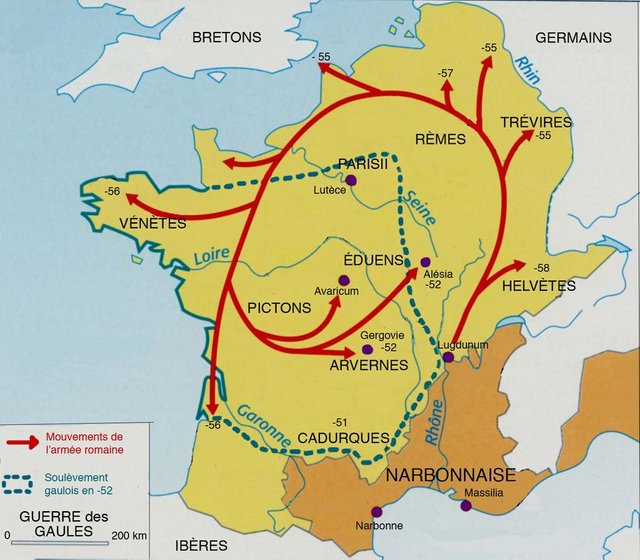
One War Leads to Another
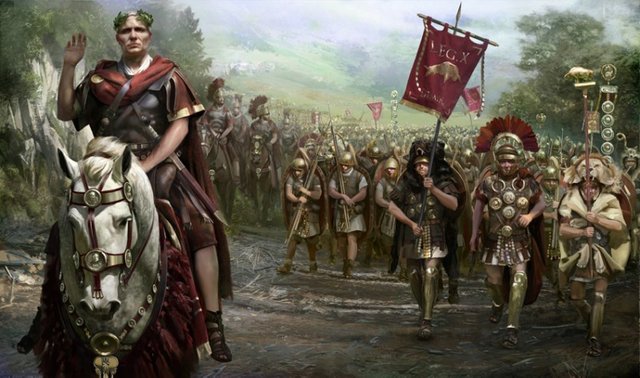
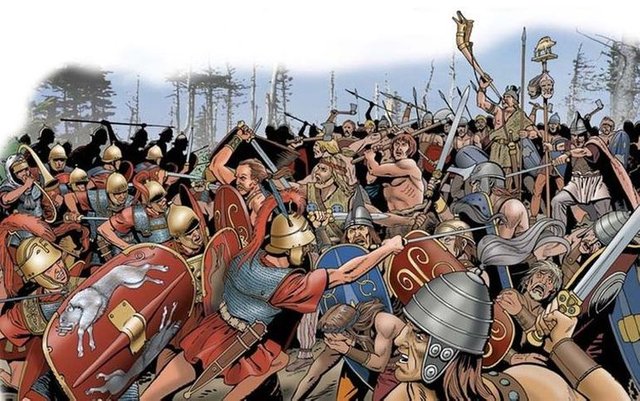
[Source]
Even better, Caesar is aware that his success could lure some other nation willing to grab a slice of the Gallic cake and this is probably why - in a lightning-quick prowess of engineering - he crosses the Rhine in 55BC because he fears that:
the Germans should by degrees become accustomed to cross the Rhine, and that a great body of them should come into Gaul, he saw [would be] dangerous to the Roman people, and judged, that wild and savage men would not be likely to restrain themselves, after they had possessed themselves of all Gaul, from going forth into the province and thence marching into Italy
One can read easily between the line: Gaul is now a Roman protectorate and he will not suffer any interloper.
As if it was not enough, Caesar even decides to cross the Channel and probe the mythical island lying beyond the sea, with a perfect excuse for his imperialistic campaign:
Caesar [...]resolved to proceed into Britain, because he discovered that in almost all the wars with the Gauls succors had been furnished to our enemy from that country
Caesar leads two campaigns in Britain, but the state of the country, the lack of intelligence about the place, the weakness of his own forces obliges him to quickly put an end to it, after establishing a diplomatic tribute which the tribes must pay to Rome every year. But the main reason is that, in Gaul, the peace is just nominal.
Gauls: Fickle and Fighting
There is nothing more wrong than to think that Caesar had it easy during all those years and that Gauls were more than ready to lay down their arms and roll over at the first sight of the Roman standards.

[Source]
As soon as the Gauls saw clear in Caesar’s game, they started to plot in order to raise an army capable to eject him out of Gaul. They were particularly incensed to see the Roman legions breaking camp for winter in Gallic territory, the usual practice of an invader. But of course, all the tribes were divided by bitter and ancestral feuds and quarrelled incessantly about preeminence between themselves.
In Brittany, the tribes of the Venetes tried to rebel against the growing influence of Rome because their trade with Britain was threatened. In spite of their resolution to fight to the death, that didn’t go down very well for the Veneti, who were overcome by Caesar on land and sea:
having, therefore, put to death all their senate, he sold the rest for slaves.
Veneti, Unelli, Aulerci, Sexovii, Sotiates, Aquitani, Usipetes, Menapii… The letters of Caesar is a catalogue of forgotten Gallic tribes who rebelled, stupidly valiantly challenged the Roman yoke on their own and then were relentlessly crushed by the methodical Roman war machine.
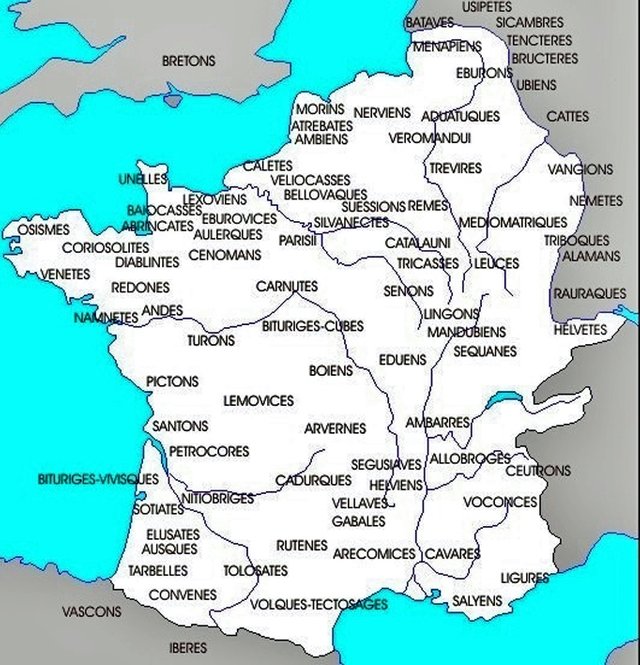
A short map of many of the tribes of Gaul [Source]
In front of them, Caesar was single-minded and relied on an army increasingly experienced, determined and enamoured with its leader, who knew they had no choice but to obey and win or to be vanquished and annihilated by barbarians not in the mood for forgiveness, like what happened when the Eburones of the leader Ambiorix managed to trap and slaughter a whole legion (8000 men) at Aduatuca:
They with difficulty sustain the attack till night; despairing of safety, they all to a man destroy themselves in the night. A few escaping from the battle, made their way to Labienus at winter‐quarters, after wandering at random through the woods, and inform him of these events.
However, Caesar knew that, as long as the Gallic tribes were divided, he would be able to use them and control them like pawns, and that’s why he also generously promoted the tribes and chiefs who submitted willingly to his rule.
The Great Revolt
By 52 BC, with Gaul seemingly at peace, Caesar goes back to Rome in order to deal with the situation there (one of his closest ally has just been murdered). Hearing of the situation, some tribes take that as a sign of weakness and as the best opportunity to strike:
The leading men of Gaul, having convened councils among themselves in the woods [...]:: they point out that this fate may fall in turn on themselves: they bewail the unhappy fate of Gaul; and by every sort of promises and rewards, they earnestly solicit some to begin the war, and assert the freedom of Gaul at the hazard of their lives
And to seal the pact, the tribe of the Carnutes attack and slaughter the Roman citizens in the town of Genabum (modern day Orleans). If you look at the map, you can see it’s really far from Rome, and a sign of the increasing penetration of Roman elites and merchants into Gaul.
Hearing about the news, in central Gaul, a young man called Vercingetorix rushes to take the lead among his people, the Arverni in the coming rebellion. However, the nobility rejects his plan and he is chased out of town.
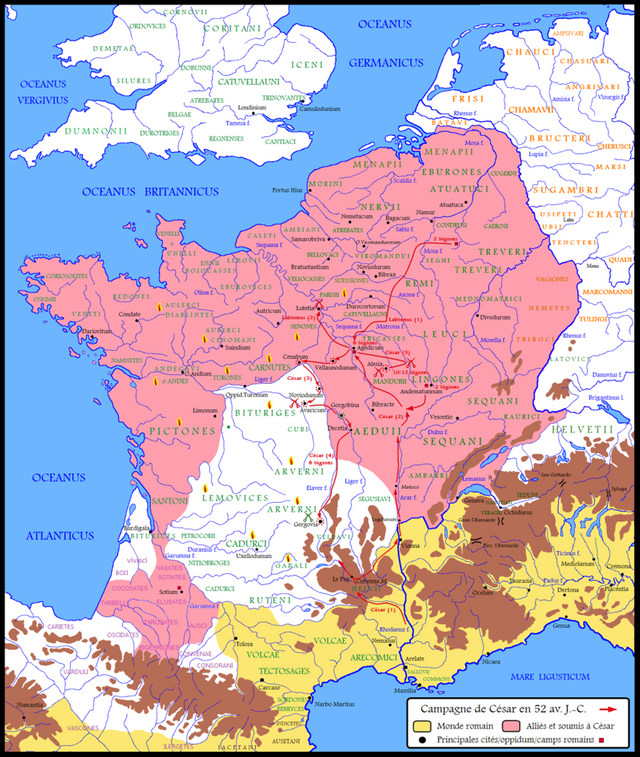
In white, the territory of the tribes which took the side of Vercingetorix against Caesar. [Source]
How similar to the fate of Arminius a few decades later, isn't? Some historians go as far as saying that Vercingetorix even met, allied himself and fought alongside Caesar during his campaigns, before to become disillusioned. But there are not enough evidence to prove it conclusively.
All that we know is that, rather than abandoning, Vercingetorix - says Caesar in his letters - managed to gather an army of faithful followers among the lower parts of the population and to get back to the town of Gergovia (modern day Clermont) and take over the mantle of leader from the elite which had taken the side of the Romans:
Having collected such a body of troops, he brings over to his sentiments such of his fellow‐citizens as he has access to: he exhorts them to take up arms in behalf of the general freedom, and having assembled great forces he drives from the state his opponents, by whom he had been expelled a short time previously.
His rise is meteoric: he sends embassies to all the tribes of central Gaul, levies troops and exerts the most ruthless authority:
for on the commission of a greater crime he puts the perpetrators to death by fire and every sort of tortures; for a slighter cause, he sends home the offenders with their ears cut off, or one of their eyes put out, that they may be an example to the rest, and frighten others by the severity of their punishment
When Caesar hears the news, he rushes back to Transalpine Gaul and faces a dire situation, cut off as he is from his legions:
For if he should summon the legions into the province (ie Transalpine Gaul), he was aware that on their march they would have to fight in his absence; he foresaw too that if he himself should endeavor to reach the army, he would act injudiciously, in trusting his safety even to those who seemed to be tranquilized.
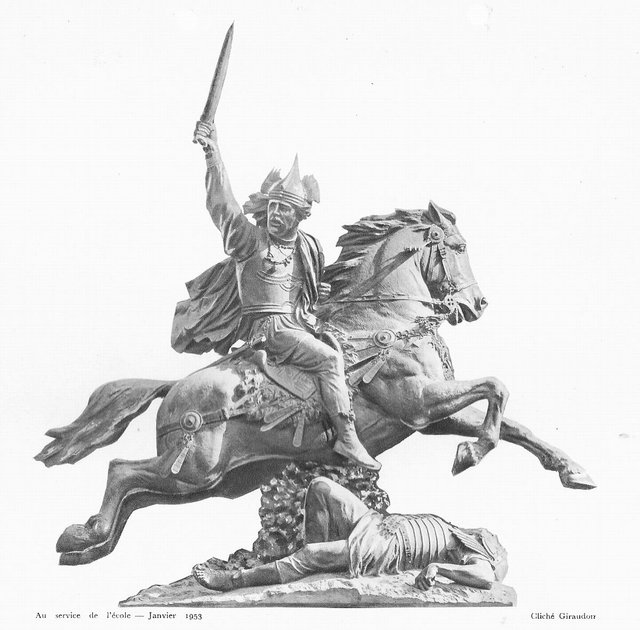
To be continued...SOURCES
http://www.historyofwar.org/articles/wars_gallic.html
https://prezi.com/yikozvla9o9a/gallic-wars-timeline/
http://www.ancient.eu/vercingetorix/
Very interesting, thanks for the detailed post 😀
Thanks for sharing this good quality post
Great article! Always a good thing to read De Bello Gallico as propaganda 8-). I have visited Gergovia, Bibracte, Alesia, etc. just to have been there, the museum at Mont Beuvray is well worth a visit if you are interested in this bit of history.
thanks for sharing
very interesting